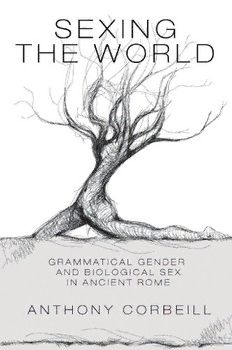
Sexing the World: Grammatical Gender and Biological Sex in Ancient Rome PDF
Preview Sexing the World: Grammatical Gender and Biological Sex in Ancient Rome
Sexing the World Sexing the World Grammatical Gender and BioloGical Sex in ancient rome Anthony Corbeill princeton university press princeton and oxford Copyright © 2015 by Princeton University Press Published by Princeton University Press, 41 William Street, Princeton, New Jersey 08540 In the United Kingdom: Princeton University Press, 6 Oxford Street, Woodstock, Oxfordshire OX20 1TW press.princeton.edu Jacket illustration: Copyright © Muamu/Shutterstock. All Rights Reserved Library of Congress Cataloging-in-Publication Data Corbeill, Anthony, 1960– author. Sexing the world : grammatical gender and biological sex in ancient Rome / Anthony Corbeill. pages cm Includes bibliographical references and index. ISBN 978-0-691-16322-2 (hardcover : alk. paper) 1. Latin literature—History and criticism. 2. Latin language—Gender. 3. Gender identity in literature. I. Title. PA6029.E87C67 2015 870.9ʹ3538—dc23 2014019102 British Library Cataloging- in- Publication Data is available This book has been composed in Minion Pro text with Myriad Pro display Printed on acid- free paper. ∞ Printed in the United States of America 10 9 8 7 6 5 4 3 2 1 Hdc et eSG magistris optimis Contents acknowledgments ix Introduction: Latin Grammatical Gender Is Not Arbitrary 1 Chapter 1 Roman Scholars on Grammatical Gender and Biological Sex 12 Chapter 2 Roman Poets on Grammatical Gender 41 Chapter 3 Poetic Play with Sex and Gender 72 Chapter 4 Androgynous Gods in Archaic Rome 104 Appendix to Chapter 4: Male/Female Pairs of Deities 136 Chapter 5 The Prodigious Hermaphrodite 143 abbreviations 171 Works cited 173 index locorum 189 General index 199 Acknowledgments Numerous institutions and individuals have allowed me to think and write about grammatical gender for the past decade. Initial research was conducted at the Institute for Research in the Humanities at the University of Wisconsin, Madison, during a time highlighted by frequent conversations with Michael Kulikowski and James McKeown. Additional research and writing were com- pleted as a Visiting Fellow at All Souls College, Oxford, where the availability of James N. Adams could not help but stimulate serious thinking about the Latin language. A final draft was finished at my home institution, the University of Kansas, as a Fellow at the Hall Center for the Humanities; without the Hall Center, intellectual life in Lawrence would be much poorer and I am proud of my association with it over the past two decades. I also thank my hosts for invi- tations to speak at various colleges and universities. On these and other occa- sions the following people have considerably enriched my thinking by sharing thoughts and publications: David Blank, Amy Coker, Nancy de Grummond, Claudia Fernández, William Fitzgerald, Simon Goldhill, Philip Hardie, John Henderson, Lora Holland, Joshua Katz, Kezia Knauer, Jerzy Linderski, Marcos Martinho, Allen Miller, Robert Morstein- Marx, William Race, Robert Rene- han, Emma Scioli, Alan Shapiro, Bert Smith, Joshua Smith, Emma Stafford, Jaana Vaahtera, and Brian Walters; special encouragement and advice always came from Nicholas Horsfall and Jocelyn Kitchen. I continue to remain thank- ful for my generous colleagues and patient students in the Classics Department at the University of Kansas; special gratitude goes to Lizzy Adams, whose care as a research assistant not only detected errors but also forced me to reevaluate several claims. Lastly, thanks to Rob Tempio of Princeton University Press for his interest, and for the detailed and challenging comments from one of the referees of the manuscript. An earlier version of chapter 1 has appeared in Transactions of the American Philological Association 138 (2008): 75–105. This book could not have been written without the initial and continued inspiration of the two teachers in the dedication. Professor H. D. Cameron en- couraged me as an undergraduate to follow my instincts; Professor Erich Gruen taught me as a graduate to rein in my excesses. Although neither has read a word of what follows, what I have taken from their example can be found on every page.
